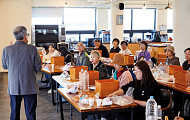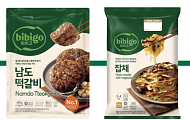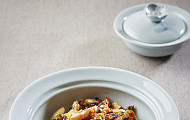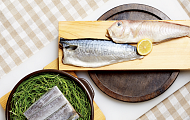※ 본 기획 취재는 (사)한국잡지협회의 지원을 받아 작성되었습니다. 그동안 '브라보 마이 라이프' 매거진과 온라인 기사를 통해 만났던 '고고가게' 시리즈를 해외 독자 분들을 위해 영문 버전으로도 준비했습니다.

‘Gogo' has several meanings such as old, elegant and outstanding. Let's take a visit to a famous restaurant that perfectly fits this expression, 'Gogo Eateroes'. It's easy to select and find just near the subway, let's shout 'go-go'.
●Busan Story●
#1 Since 1959, Baekgudang(백구당)

Baekgudang, meaning 'white seagull', is the oldest western-style bakery in Busan. For 60 years over 3 generations, the name changed into 'New Paris Bakery' and the store changed its size, but the taste of bread is unchanged. Jo Jae-bung (54), the third owner said, "Our secret of long-run was introducing new tastes through study while maintaining old ways with honest ingredients." From sweet paste bun and western-style cakes of early days to 'Croissant' made 45 years ago by the second owner, and 'Mugwort & Rice Loaf' developed by the present owner, the fame continued throughout the past and the present. Especially, Jo Jae-bung focuses on combining Korea's local seasonal food ingredients with bread.
"We strive to develop bread using local seasonal food. We made mugwort castella in the spring, and red persimmon roll cake in the autumn. We choose good ingredients directly from production areas. We do natural fermenting without additives or preservatives. We have pride in honest ingredients, and I feel worthwhile because we never deceive our customers."
He has philosophy and pride about bread to the extent of a craftmanship, but in fact, he didn't have plan to inherit Baekgudang in the first place. After graduating from the university in Seoul, he worked diligently in a large construction company. But when his father had a stroke, a shadow was cast on Baekgudang. His family was concerned over inheriting Baekgudang, and at last, Jo Jae-bung took the lead as the eldest.
"In order to succeed, I went to the Korea Baking School, obtained certificates and studied business at a Graduate School. I joined father's business in August 2000, and in the first 6 months, I pushed myself into work from 4am in the morning until 12am midnight. Fortunately, at that time my father still had energy and I received the technique to bake bread."
Does he have plans to pass down the business? Instead of the expression, 'inheriting the business', he began to talk, "I will take business temporarily'.
"Baekgudang will keep going, and I took it over in the meantime. Next, I hope my second son to take it, but I cannot assure, because my father first considered passing down to my younger brother. In the end, I think it would be Baekgudang's duty to choose the next owner. (Laughs)"
Address 3, 81 beon-gil, Jungangdae-ro, Jung-gu, Busan
Opening Hours Mon - Sat 8am - 10pm, Sun 9am - 5pm, National Holiday 9am - 6pm
Representative Menu Croissant, Mugwort & Rice Loaf, Pie Manju, etc.
#2 Since 1967, Yangsan House(양산집)

We cannot leave out 'Pork and Rice Soup' when we visit Busan. Above all, Yangsan House was the first restaurant to sell pork and rice soup on the street of Kkangtong Market. Somehow the old pork and rice soup restaurant reminds you of an elderly granny, but this place is run by a young man of early thirties, Noh Chi-gwon (31). For a famous restaurant for its taste, people may easily think that he gained benefit from inheriting family business, but it was a different story with Mr. Noh. When he prepared for an exchange student program in the U.S after being discharged from the army, his father and mother passed away one after another from sickness. In the abrupt parting, what remained were Yangsan House and passion of a young man of twenties. The owner, in memory of the times, said, "I had no choice."
"I had to earn money for living right away, and I thought it would be better to carry on the family business instead of working in a company. In general, you inherit knowhow of how to cook food and run a business from the previous generation, but I had no time for any of these. I tried to reproduce the taste by adding advice from relatives and acquaintances to my over-the-shoulder knowledge, but it tasted terrible in the beginning. I often heard customers saying, 'It's not as good as it used to be since the son took over the business.' At that time, I could not post the title of 'Business in Third Generation'.
He went into the business without knowing how to cut. For a while, he learned cutting skills by working in a nearby Japanese restaurant after work. He gradually got closer to the original taste by studying soup within ingredients used by his grandmother and mother. This way, he gained approval of neighboring merchants and regulars, and finally in 2014, he declared the title confidently, 'Business in Third Generation'.
"I worked hard to restore the original hand taste, but even more, I keep it in mind, 'Inheriting the Spirit'. My grandmother and mother always helped those in need while they worked laborious business. Over three generations, I thought it would be worthwhile to inherit the philosophy of the past generations instead of only inheriting materials. Originally, the title was named after the name of region, and they gave it a meaning of 'Endless Charity' from its Chinese meanings, 'raising'(養) and 'flowing'(汕).
In fact, Yangsan House has been donating a part of its profit to poor neighbors and organizations. Like his grandmother always said, "Feed everybody", he has been warming the world with his 'large bowl' he inherited from his early generations.
"Like a warm bowl of soup melts your body and soul, I want to share warmth with people. I feel so proud by the thought that I can help somebody to survive with the money from my hard work. I want to become a 'large bowl' that can share warmth with people like a bowl of soup."
Address 30, 47 beon-gil, Junggu-ro, Jung-gu, Busan (9 minutes’ walk from Jagalchi Station)
Opening Hours Everyday 10am - 8pm, Break Time: 3pm - 5pm
Representative Menu Pork and Rice Soup, Boiled Pork Slices, Boiled Pork Slices Meal
#3 Since 1950, Seongil House(성일집)

Seongil House, boasting the longest history among sea eel restaurants in the alley at the back of former Busan City Hall, is run by the second owner, Choi Young-sun and her son Kim Seong-yong. 68 years old Mrs. Choi devotes in trimming sea eels for four hours every day. You're mistaken if you think of finger-sized sea eels that you eat over drinks. It's as thick as a tight fist, and as long as the owner's arm. This is possible only because the sea eels are grown in Korea. The owners were proud of their matchless ingredients.
"People who used to eat eel in other restaurants are surprised at our food. Most restaurants use cheap imported sea eels or even cheaper frozen sea eels. It might be better if we think only of the profit, but now we work for the tradition of Seongil House and my reputation rather than money. When this passes down to my son, it will be one hundred years of history, and I believe that I should pass down such confidence."
She says that she's not chasing after money, but when she inherited Seongil House from her mother-in-law, they were in a complicated situation. After the Korean War, she began cooking sea eels and opened up a restaurant to feed eight children in difficult circumstances, but at that time, sea eels were not popular. Choi's strong will contributed to bringing Seongil House to feet.
"I got married when I was twenty, but we didn't have a wedding because we had a debt. I promised mother-in-law that 'I will work hard and have a wedding ceremony 10 years later.' I put everything into sea eels. Thankfully, I paid off the debt in 10 years, and the family budget improved, and I could have a wedding ceremony. I think I lived a successful life because I raised my kids who gave me beautiful grandchildren. I'm happy because I don't have to borrow from others but give mine."
Another pride of Seongil House is that they do not use 'artificial seasoning'. Instead, the broth made from 23 oriental medicinal herbs enhances the savory taste. The combination of high quality sea eels and medicinal herbs means healthy food. These efforts were originated from her love toward grandchildren.
"Sea eels are highly nutritious with high proteins, and are good for the growth of children. But most children don't like its taste. I asked my grandson to eat sea eels 20 times in return for the latest mobile phone. After promising this, I thought night and day how to make healthier taste. After trying various medicinal herbs, seaweeds and vegetables, I came up with today's seasoning. We will never use artificial seasonings in the future. And I have to feed my grandson four more times (Laughs)."
Address 103, Daegyo-ro, Jung-gu, Busan (3 minutes’ walk from Nampo Station)
Opening Hours Everyday 11am - 11pm
Representative Menu Grilled Salted Sea Eel, Grilled Marinated Sea Eel














